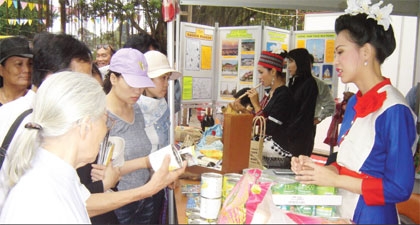Putting an arm around ASEAN to lift its game
Prime Minister Nguyen Tan Dung said ASEAN’s most important missions were to exercise signed agreements, push forward with economic integration, explore cooperation opportunities and implement free trade agreements with ASEAN partners.
 |
The missions also went to introduce sustainable and balanced development policies, assure economic developments while maintaining social security and environment protection and effectively handle global issues.
At last week’s ASEAN Business and Investment Summit (ASEAN-BIS) 2010 organised in Vietnam for the first time, Dung said an institutional framework to build an ASEAN Economic Community and ASEAN+1 Free Trade Area networks remained initial steps.
“Whether these efforts can turn into successes for business and the region’s strong growth depends heavily on the dynamism of the region’s business community. Enterprises should make the most of the opportunities offered by policy programmes established by ASEAN governments to enhance connectivity, boost trade and investment activities, including public private partnership,” he said.
Co-organised in Hanoi by the ASEAN Business Advisory Council (ASEAN-BAC), Vietnam Chamber of Commerce and Industry and relevant ministries and agencies, ASEAN-BIS 2010 endeavoured to implement the commitments that approved by the 7th ASEAN in 2001, transforming the private business sector into a key contributor to the region’s economic development.
The event’s vice chairwoman Dang Thi Hoang Yen said ASEAN’s growing economy was a golden opportunity for the region’s enterprise community.
Yen, who is also chairwoman of the Vietnamese Tan Tao group, said the world had gone through a “global reset” and ASEAN had managed the economic storm well. Even the International Monetary Fund’s latest estimates have upgraded the region’s gross domestic product growth to 6.7 per cent in 2010, which was a rate that many non-ASEAN countries would willingly trade places for.
She told hundreds of regional commerce and industry leaders at the event that: “We need your advocacy and leadership to help further move ASEAN towards the economic integration by 2015. We need your dedication and support to help ASEAN cope with challenges of globalisation and competition around and outside of the region and join forces to put all our combined strengths.”
Particularly, for the first time on ASEAN-BIS, there have been direct and indirect discussions with strategic partners of the ASEAN, such as Australia, New Zealand, China, India, Japan, Korea and Russia.
This Vietnam-devised initiate had marked a significant period in developing and advancing long-term and sustainable relationship between ASEAN and associated parties, said an ASEAN-BAC statement.
What the stars mean:
★ Poor ★ ★ Promising ★★★ Good ★★★★ Very good ★★★★★ Exceptional
 Tag:
Tag:
Related Contents
Latest News
More News
- MAE names big 10 policy wins in 2025 (February 06, 2026 | 08:00)
- US firms deepen energy engagement with Vietnam (February 05, 2026 | 17:23)
- Vietnam records solid FDI performance in January (February 05, 2026 | 17:11)
- Site clearance work launched for Dung Quat refinery upgrade (February 04, 2026 | 18:06)
- Masan High-Tech Materials reports profit: a view from Nui Phao mine (February 04, 2026 | 16:13)
- Hermes joins Long Thanh cargo terminal development (February 04, 2026 | 15:59)
- SCG enhances production and distribution in Vietnam (February 04, 2026 | 08:00)
- UNIVACCO strengthens Asia expansion with Vietnam facility (February 03, 2026 | 08:00)
- Cai Mep Ha Port project wins approval with $1.95bn investment (February 02, 2026 | 16:17)
- Repositioning Vietnam in Asia’s manufacturing race (February 02, 2026 | 16:00)






















 Mobile Version
Mobile Version